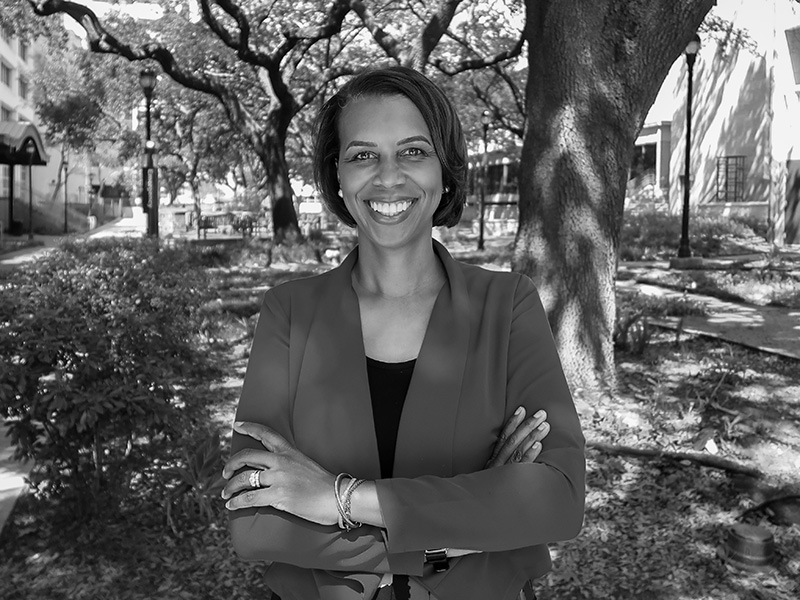LaTanya Love, MD

Dean of Education, ad interim
Associate Professor of Pediatrics
Executive Vice President, Student Affairs
In early 2020, we started hearing about COVID cases. Once the rodeo was cancelled, we knew COVID had officially arrived in Houston, and we had to make some important decisions quickly that were hard decisions, impacting our academic schedule and traditions.
“We learned that technology can be our friend. I’m grateful technology has evolved, and that we have adapted to it.”
Considering Match Day was the first decision. Talking with our infectious disease experts, looking at state and national data, it wasn’t going to be safe, so we had to cancel our traditional in- person Match Day. It was an extremely difficult decision to make, but it was the right thing to do.
The next big decision was what are we doing with current students? We gathered in a “war room” to think about how we could change our learning model to keep everyone safe – the entire UTHealth community. We decided to switch to virtual learning for everyone. All of our medical school classes were at different educational points, so we had to think strategically about continuing the educational experience for each year. We offered virtual and asynchronous learning, and it worked out well given the circumstances and challenges that were around us.
The Office of Admissions and Student Affairs and the Office of Educational Programs created a committee to focus on returning the students to campus. We met weekly, and our various subcommittees met more frequently. Students were an integral part of this committee. We were able to bring back the clinical students in mid- to late June. A lot of people helped make it possible, including procurement, which assisted with PPE – surgical masks, safety goggles, everything we needed. We had to shorten and modify the clerkships, but it worked out. By July, we realized that was the right thing to do – nothing can replace hands-on patients for clinical students. And our students were eager to come back.
Then in August, we were looking at what to do with our new class of incoming students. We usually host all kinds of welcoming activities to acclimate them to McGovern. We knew it wouldn’t be safe to have the Annual Henry Strobel Retreat at Camp Allen, so student leaders did a good job of providing a red-carpet welcome at the Medical School Building.
Going into the fall 2021 semester, COVID-19 cases were high in Houston. The Curriculum Committee had to modify gross anatomy by creating smaller student groups. We transitioned problem-based learning to virtual platforms and moved our team-based learning to virtual platforms. We have been streaming our medical lectures or years and found that the students prefer it, so this pivot was not that challenging for us. We successfully made it through the first semester with some modifications.
Now that the PPE supply was better and the vaccine was in works, we looked at offering more for the spring semester. We were so fortunate that UTHealth was able to offer the vaccine to all of our learners – it made people feel better about coming back to campus. Now the first- and second-years having been going into clinic as part of their preceptorships, and of course our clinical students have been nonstop since June. We are all waiting to see where the future lies for us. We have cancelled in-person Match Day again, but we are cautiously optimistic for an in-person Commencement at a large venue, Minute Maid Park.
Our admissions process has been all virtual – a complete change for us, which was difficult as we really enjoy welcoming potential students to our campus and the Texas Medical Center. We had a few hiccups along the way, but by midway we were running our virtual interviews like a well-oiled machine. We have such amazing student ambassadors and a great admissions team who knows how to problem solve all the technological challenges we might face. We had prepared faculty interviewers who became more accustomed to the technology during the process. This ended up being a highly competitive year for medical school admissions. We received more applications than we have ever received before. We were fortunate that the virtual interviews allowed us to interview more applicants than ever before and allowed our faculty interviewers flexibility.
We learned that technology can be our friend. I’m grateful technology has evolved, and that we have adapted to it. I think we will continue to offer online events to reach a wider audience. Some of our students prefer the virtual platform.
We will need to sit down and debrief and review student feedback to see what worked best. I miss seeing students and co-workers in the hallway to bounce ideas off of each other, and we want to get students on campus as much as we can the next year. We also learned how resilient our students, faculty, and staff are. When we had to pivot in the beginning stages, our faculty did such an amazing job, going above and beyond to ensure students were still getting a quality education despite the challenges. People were having to deal with their own personal issues yet still showing up every day giving 100 percent.
